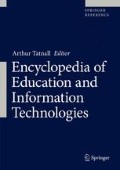Access this chapter
Tax calculation will be finalised at checkout
Purchases are for personal use only
References
Aldrich C (2005) Learning by doing: a comprehensive guide to simulations, computer games, and pedagogy in e–learning and other educational experiences. Wiley, San Francisco, 400 p
Barot C, Lourdeaux D, Burkhardt J-M, Amokrane K, Lenne D (2013) V3S: a virtual environment for risk-management training based on human-activity models. Presence Teleop Virt 22:1–19
Bruckman A (1999) Can Educational Be Fun? In Proceedings of the Game Developer’s Conference. San Jose, California, USA
Caillois R (1961) Man, play and games. Free Press. Washington, DC, USA
Carron T, Marty J-C, Heraud J-M (2008) Teaching with games based learning. Management systems: exploring and observing a pedagogical dungeon. Simul Gaming 39:353–378
Dondlinger MJ (2007) Educational video game design: a review of the literature. J Appl Educ Technol 4:21–31
El-Nasr MS, Smith BK (2006) Learning through game modding. Comput Entertain 4
Eyster T (2008) Playing game in class, a beginner’s guide for higher education. Internal report. University of Kaplan, Kaplan
Fabricatore C (2000) Learning and videogames: an unexploited synergy. In: Proceedings of the Association for Educational Communications And Technology, AECT, Long Beach
Federation of American Scientist (2006) R&D challenges in games for learning. p 17. The Learning Federation. Washingtown DC, USA
Garris R, Ahlers R, Driskell JE (2002) Games, motivation, and learning: a research and practice model. Simul Gaming 33:441–467
Gené OB, Núñez MM, Blanco ÁF (2014) Gamification in MOOC: challenges, opportunities and proposals for advancing MOOC model. In: Proceedings of the international conference on technological ecosystems for enhancing multiculturality, TEEM. ACM, New York, pp 215–220
Habgood MPJ (2007) Zombie division: evaluating principles of intrinsic integration. In: Proceedings of serious games summit, San Francisco
Huguet L, Sabouret N, Lourdeaux D (2016) Errare Humanum Est: simulation of communication error among a virtual team in crisis situation. In: Proceedings of the international conference on Cognitive Informatics Cognitive Computing, pp 344–350. Palo Alto, CA, USA
Kafai YB, Franke ML, Shih JC, Ching CC (1998) Game design as an interactive learning environment for fostering students’ and teachers’ mathematical inquiry. Int J Comput Math Learn 3:149–184
Kamii C, DeVries R (1980) Group games in early education: implications of Piaget’s theory. National Association for the Education of Young Children. Washington, DC, USA
Karoui A, Marfisi-Schottman I, George S (2017) JEM iNVENTOR: a mobile learning game authoring tool based on a nested design approach. In: Proceedings of the mobile learning European conference, Larnaca
Kirriemuir J, Mcfarlane A (2004) Literature review in games and learning. NESTA Futurelab. Washington, DC, USA
Kücklich J (2005) Precarious playbour: modders and the digital games industry. Fibreculture J 5:FCJ–025
Lederman L (1992) Debriefing: toward a systematic assessment of theory and practice. Simul Gaming 23:145–160
Lenhart A (2015) Teens, social media & technology overview 2015. Pew Research Center. Washington, DC, USA
Lepper MR, Malone TW (1987) Intrinsic motivation and instructional effectiveness in computer-based education. In: Aptitude, learning and instruction. Erlbaum, Hillsdale, pp 255–286
Marfisi-Schottman I, George S, Tarpin-Bernard F (2010) Tools and methods for efficiently designing serious games. In: Proceedings of the European conferences on games based learning, ECGBL, Copenhagen, pp 226–234
Marfisi-Schottman I, Vinatier I, Bevacqua E, Kébé M (2018) Enabling teachers to create authentic interview simulations. In: Proceedings of the world conference on educational media and technology, EdMedia, Amsterdam, pp 1506–1511
Mariais C, Michau F, Pernin J-P (2012) A description grid to support the design of learning role-play games. Simul Gaming 43:23–33
Mayo MJ (2007) Games for science and engineering education. Commun ACM 50:30–35
Mehm F, Göbel S, Steinmetz R (2010) User support in digital educational game authoring tools. In: Proceedings of the international ELBa science conference, Stuttgart, pp 202–211
Moreno-Ger P, Burgos D, Martínez-Ortiz I, Sierra JL, Fernández-Manjón B (2008) Educational game design for online education. Comput Hum Behav 24:2530–2540
Nacke LE, Bateman C, Mandryk RL (2014) BrainHex: a neurobiological gamer typology survey. Entertain Comput 5:55–62
National Research Council (2000) How people learn: brain, mind, experience, and school: expanded edition. The National Academies Press, Washington, DC
Ney M, Balacheff N (2008) Learning aware environment: a Laboratorium of epidemiological studies. In: Proceedings of adaptive hypermedia, Hannover, p 10
Padilla Zea N, Medina Medina N, Gutiérrez Vela FL, Paderewski P (2011) A model-based approach to designing educational multiplayer video games. In: Proceedings of technology-enhanced systems and tools for collaborative learning scaffolding. Springer, Berlin/Heidelberg, pp 167–191
Ponder M, Herbelin B, Molet T, Schertenlieb S, Ulicny B, Papagiannakis G, Magnenat-Thalmann N, Thalmann D (2003) Immersive VR decision training: telling interactive stories featuring advanced virtual human simulation technologies. In: Proceedings of the workshop on virtual environments, EGVE, New York, pp 97–106
Prensky M (2001) Digital natives, digital immigrants. MCB Université Press. Washington, DC, USA
Ryan RM, Deci EL (2000) Self-determination theory and the facilitation of intrinsic motivation, social development, and well-being. Am Psychol 55:68–78
Sanchez E, Monod-Ansaldi R, Vincent C, Safadi-Katouzian S (2017) A praxeological perspective for the design and implementation of a digital role-play game. Educ Inf Technol 22:2805–2824
Thiagarajan S, Thiagarajan R (2003) Design your own games and activities: Thiagi’s templates for performance improvement. Jossey-Bass, San Francisco
van Oostendorp H, van der Spek ED, Linssen JM (2014) Adapting the complexity level of a serious game to the proficiency of players. EAI Endorsed Trans Serious Games 1:1–8
Vigier M, Bryant M (2009) The astonishment report: a pedagogical tool to assist students in learning from their international experience. Glob Bus Lang 14:41–54
Author information
Authors and Affiliations
Corresponding author
Editor information
Editors and Affiliations
Section Editor information
Rights and permissions
Copyright information
© 2020 Springer Nature Switzerland AG
About this entry
Cite this entry
Marfisi-Schottman, I. (2020). Games in Higher Education. In: Tatnall, A. (eds) Encyclopedia of Education and Information Technologies. Springer, Cham. https://doi.org/10.1007/978-3-030-10576-1_35
Download citation
DOI: https://doi.org/10.1007/978-3-030-10576-1_35
Published:
Publisher Name: Springer, Cham
Print ISBN: 978-3-030-10575-4
Online ISBN: 978-3-030-10576-1
eBook Packages: Computer ScienceReference Module Computer Science and Engineering

